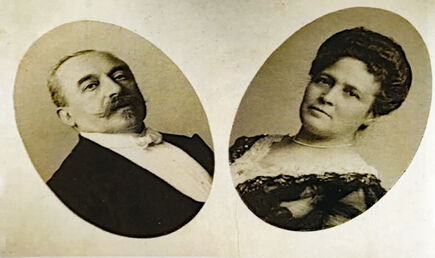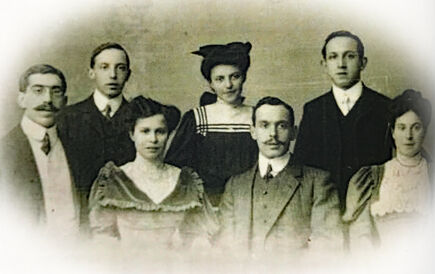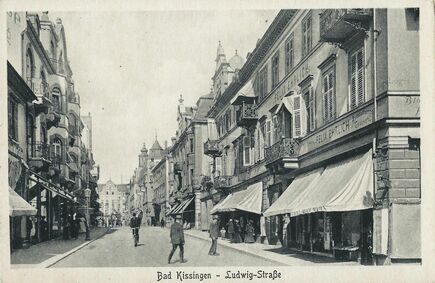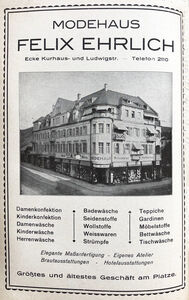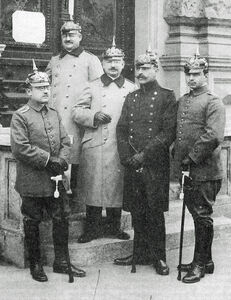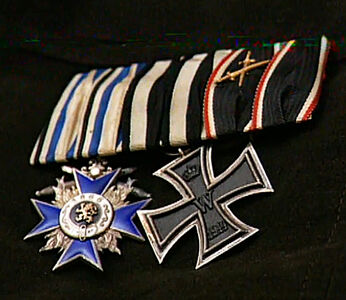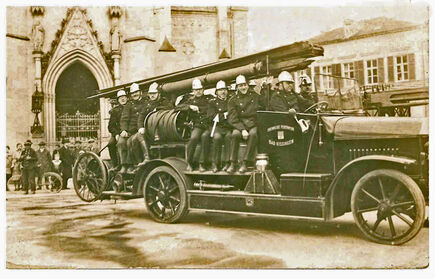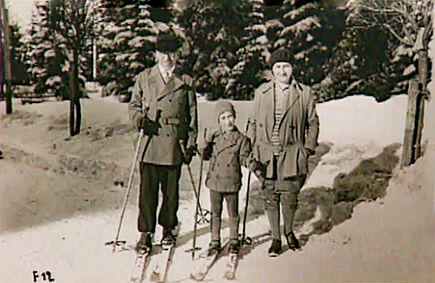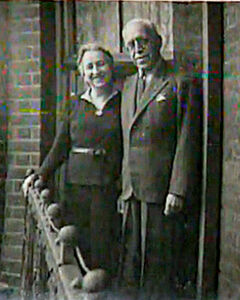personal data
Ehrlich Franz
Parents: Felix and Clara Ehrlich née Oppenheim
Siblings: Ludwig, Else, Paul, Martha, Gustav, Friedel Ehrlich
Spouse: Adele Leven
Children: Fred (Fritz), Felicitas (Liesel) m. Schreiber:
Ludwigstraße 17 (now 10)
April 1937 emigrated to London
biography
Franz Ehrlich came from a long-established Jewish commercial family. His grandfather Samuel Ehrlich had been given the license for cloth trading in 1841 and had later opened a textile shop in Obere Marktstrasse. His son Felix Ehrlich had further expanded the family business and was awarded the title of “Royal Bavarian Supplier of the Court”. Since 1887, he ran a flourishing fashion shop at the corner of Ludwigstrasse and Kurhausstrasse. After his marriage to Clara Oppenheim, Franz was born in 1885 as the third of seven children.
Presumably after finishing Realschule, Franz Ehrlich learned his trading business in a big firm in England. (In his autobiography, Joske Ereli mentions 1908 as the year when his uncle Franz Ehrlich finished his professional training in London.) However, this statement coincides with his time as “Einjährig Freiwilliger” (Volunteer of One Year) from April 1907 till April 1908, which is clearly documented. It can, therefore, be assumed that his time in London was after his time at school and before his military service.) At that time, he lived with his uncle Ludi in London. On April 1, 1907, he reported for duty as “Einjährig Freiwilliger” at Infantry Regiment 9. After his release from military service, he studied medicine at Munich University for two semesters but earned his living as a bank official in his hometown. Right at the beginning of World War I, he was sent to the Western Front, was wounded in action several times, got some military awards, and was eventually appointed lieutenant of the reserve. After the war, he was a member of “Reichsbund jüdischer Frontsoldaten” (Reichsbund of Jewish front soldiers) that had been founded in 1919. Its aim was the defense against anti-Semitism in Germany by reminding of the fact that about 85,000 German Jews had fought in World War I, about 12,000 of whom were killed in the war.
In an interview, his son Fred describes his father Franz Ehrlich in retrospect as a proud patriot who was wounded in the First World War and was therefore initially awarded the Iron Cross. "... And the blue one, the other one, the enameled one, is a Bavarian Order, which my father received from the Crown Prince or the King of Bavaria […]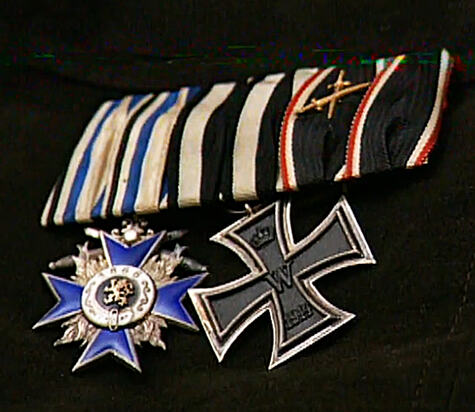
My father was particularly proud of the Bavarian Order. Because that was a rare order. It wasn't given very often. I do know there was an inspection in just outside Kissingen, at the end of 1929-1930, when the Bavarian Crown Prince came to Kissingen and inspected the ex-servicemen. And they did not tell the Nazis. That was done without the knowledge of the Nazi party. It was kept secret. And my father met the Crown Prince of Bavaria there“ (USC Shoa Foundation, Visual History Archive, Interview mit ![]() Fred Ehrlich)
Fred Ehrlich)![]() .
.
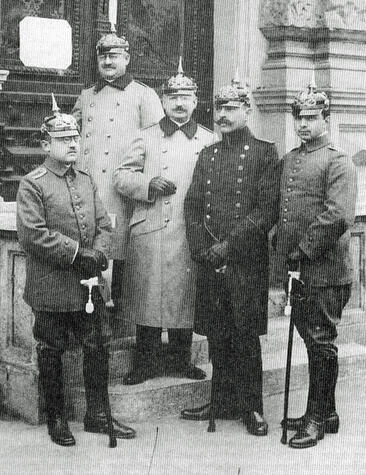
|
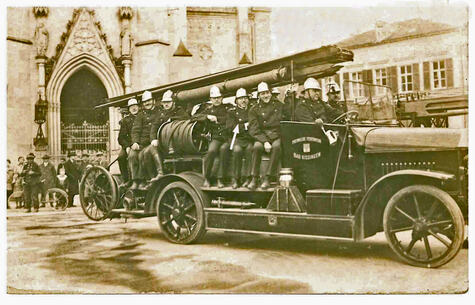
|
Franz Ehrlich married Adele (Dele) Leven from Unna/ Westphalia and had two children with her. Fritz (Fred) was born in 1922, Felicitas (Liesel) in 1926. After his father’s death in 1918, Franz took on his parents’ fashion shop together with his brother Ludwig. They had a representative new edifice built in Ludwigstrasse and strengthened the excellent reputation of the business. Just like his brother Ludwig, Franz also committed himself to the social life of his hometown. He was the commander of the voluntary fire brigade, chaired the local group of “Reichsbund jüdischer Frontsoldaten”, the aim of which was the defense of Jewish soldiers in World War I against anti-Semitic defamation. He resisted against the rise of Anti-Semitism of the Kissingen National Socialists early on. For instance, he filed charges against a Nazi parade in which hate songs against Jews had been sung in front of the Synagogue. (See H.J. Beck, Kissingen war unsere Heimat, p. 582ff.
There were no strict Jewish food rules in the Ehrlich home; no one in the house - including the other Ehrlich families - kept kosher. Another characteristic of the open and tolerant atmosphere was that Anna, a Catholic, took care of the household and the children's upbringing. Her cooking skills were appreciated by everyone in the family (see interview USC Shoa Foundation with Fred Ehrlich).
The synagogue was only attended irregularly, always for the high holidays. But of course the Ehrlichs were members of the Jewish community. They met with their Jewish friends for social gatherings and perhaps once a year organized a theater performance or a fancy costume party on Purim (cf. ibid.). And on major holidays, the extended family met in Aunt Ida's spacious apartment on the second floor.
Franz Ehrlich had - as his son remembers - "many friends - non-Jewish friends - who came into the store and said, where is the Franz? And they went out and had a beer together and talked about the ’14-18 war’. That was sometime between 1918 and around 1935" (ibid.). Quite often, these were fellow soldiers from his regiment from the district, and sometimes from the town, with whom he was friends.
However, this happy time was soon to come to an end when the National Socialists came to power. Of course, the city's largest fashion store was also immediately affected by the boycott measures, SA men prevented customers from entering the store and revenue declined. However, Fred Ehrlich also remembers customers who knew how to take advantage of the plight of Jewish business people: „The local people knew exactly what was happening. And they came and shopped. Say, a man could come in and buy a linen and tablecloths and bed linen for his daughter who was getting married, but not pay, because he knew perfectly well that a Jewish shopkeeper could, under no circumstances, demand money from a member of the Nazi party. And at the same time, we couldn't afford to refuse to supply him. So they soon got the hang of that“ (ibid.).
In 1935, local Nazis carried out a night-time attack on several Jewish shops. The glass windows of the Ehrlich fashion store were also smeared with acid. The Hebrew characters for "kosher" were engraved on them.
And in 1936 - the situation had become increasingly threatening for the family - „one of these [of his former friends, perhaps a fellow soldier] must have come in or phoned and said, Franz, it'd be better if you wouldn't be in town tomorrow morning. So my parents took the night train from Kissingen to out of town. And they traveled by train to Holland, and from Holland to England“ (ibid.).
His wife Adele returned to Bad Kissingen once again in 1937, dissolved their apartment and arranged for their two children to leave the country. Franz stayed in England because the risk of being arrested in Germany was too high for him. In April 1937, Adele left Bad Kissingen with her children Fred and Liesel to emigrate to England via Holland.
When they left for England, the family was supported by Uncle Ludi who „had to give a guarantee to the British government that we would not draw unemployment benefit or any other benefit from the British government. Because in Britain, at the time, unemployment was on a large scale. Well, that uncle was pretty well off. He could do so easily and did so, not only for my mother and me, my sister, but for a number of other members of the family.“ (Ibid.). At first they found shelter on his country estate in Bexley/Kent and Franz got a job in the City of London with a company that traded in non-ferrous metals, and Adele now took care of the household. Finally they moved to Birmingham. (See J. Ereli, p. 68). So the family stayed in England after the war, only their daughter Liesel who had joined the Zionist Movement married Herbert Schreiber and emigrated to Israel.
Franz Ehrlich died in England in May 1961 at the age of 75.
From the photo album:
References
Joske Ereli, Von Hampi Ehrlich zu Jossl Ereli- Meine Lebensgeschichte
(USC Shoa Foundation, Visual History Archive, Interview mit ![]() Fred Ehrlich)
Fred Ehrlich)![]() .
.
Hans-Jürgen Beck, Kissingen war unsere Heimat, Stand April 2017, S.582ff
Datenbank Ancestry, Familienstammbaum![]()
Photo credits
Porträtfoto © Datenbank Ancestry, Familienstammbaum![]()
Familienfotos: © Fotoalbum Fred Ehrlich
Soldatenfoto: © Hartwig Heymann
Feuerwehr-Foto © Sammlung Bötsch, Stadtarchiv Bad Kissingen
Foto und Werbeanzeige Modehaus Ehrlich: © Stadtarchiv Bad Kissingen
Back
